 |
|
 |

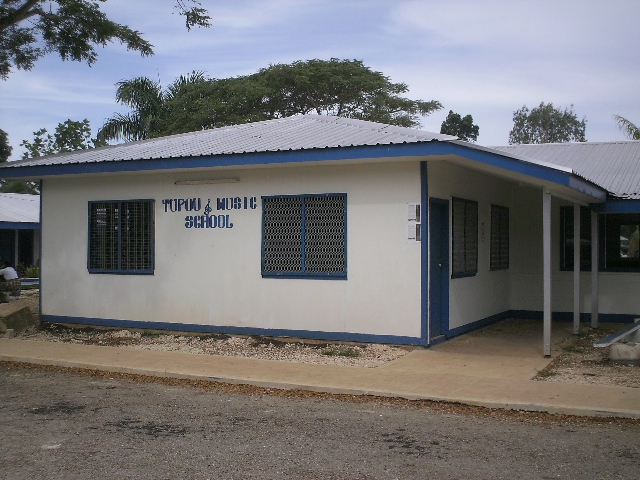 TUPOU MUSIC SCHOOL BEGAN OPERATION IN 2013 at the Tupou High School
campus in Vaololoa just south of downtown Nuku'alofa, the capitol
of the Kingdom of Tonga. The school is the longtime dream of both
Alifeleti Atiola and James Noxon. Feleti brought James back to Tonga
to begin the music school and let him do the heavy lifting on his own.
This worked out well and classes were offered in 2013 including piano
classes, sound systems engineering, and a digilab computer music class.
To get to this point, there were a number of important hurdles that
were overcome. It was the tireless effort of James and Feleti that led
to this success. First it was necessary to locate a place to begin the
classes. A series of meetings led to locating at Tupou High School.
The principal of Tupou H.S., Tui'Pulotu Finau, is a well respected
administrator in the Free Wesleyan church schools and had first met
James in 2002 when he visited First United Methodist church in Hilo,
Hawaii. James was the music director at FUMC while teaching at Hawaii
Community College, one of 11 schools in the University of Hawaii system.
The picture at the right is the exterior of the finished classrooms.
The classroom to the right is the piano lab, and on the left is the
music studio.
TUPOU MUSIC SCHOOL BEGAN OPERATION IN 2013 at the Tupou High School
campus in Vaololoa just south of downtown Nuku'alofa, the capitol
of the Kingdom of Tonga. The school is the longtime dream of both
Alifeleti Atiola and James Noxon. Feleti brought James back to Tonga
to begin the music school and let him do the heavy lifting on his own.
This worked out well and classes were offered in 2013 including piano
classes, sound systems engineering, and a digilab computer music class.
To get to this point, there were a number of important hurdles that
were overcome. It was the tireless effort of James and Feleti that led
to this success. First it was necessary to locate a place to begin the
classes. A series of meetings led to locating at Tupou High School.
The principal of Tupou H.S., Tui'Pulotu Finau, is a well respected
administrator in the Free Wesleyan church schools and had first met
James in 2002 when he visited First United Methodist church in Hilo,
Hawaii. James was the music director at FUMC while teaching at Hawaii
Community College, one of 11 schools in the University of Hawaii system.
The picture at the right is the exterior of the finished classrooms.
The classroom to the right is the piano lab, and on the left is the
music studio.
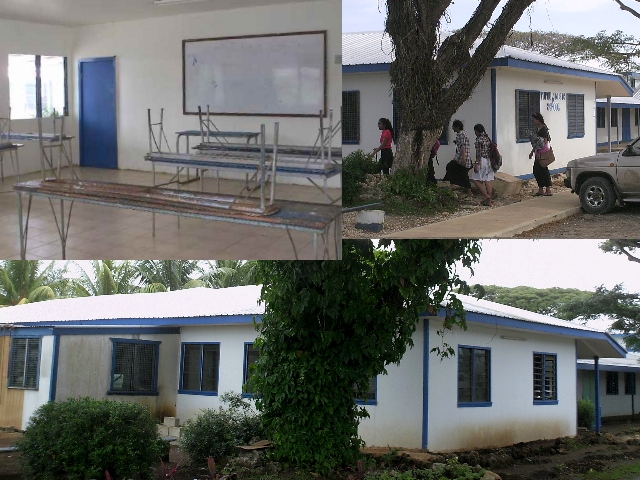 To get the classrooms built, we began with one general classroom that
was a part of the recent renovations to the Assembly Hall at T.H.S. I
remember the Assembly Hall from when I was here building the 'Home
Economics' classrooms in 2004, and it was very run down at that time.
The renovations made the hall into a very nice space, although the
RT60 (a measure of acoustics) is quite excessive for contemporary music.
In the picture at left you can see the preexisting classroom in the upper
left corner. This room was divided into the two music classrooms by
making a new wall inside. In the lower half of the photo you can see this room from
the outside, before the security grating was installed and the new
sidewalks were put in. Further to the left from the music classrooms
you can see the old canteen addition that has been used for the past
few years as the head tutor's office. On the other side of the hall
there is a brand new two story building which will house the tutor's
office once it has been completed, and there is a plan to make the
old canteen into a music school office. This will be a good use of
the space as it can be used as a ticket office for future performances
in the Assembly Hall. Recently a new digital sound engine was brought
from the USA to enable professional sound engineering in the hall.
To get the classrooms built, we began with one general classroom that
was a part of the recent renovations to the Assembly Hall at T.H.S. I
remember the Assembly Hall from when I was here building the 'Home
Economics' classrooms in 2004, and it was very run down at that time.
The renovations made the hall into a very nice space, although the
RT60 (a measure of acoustics) is quite excessive for contemporary music.
In the picture at left you can see the preexisting classroom in the upper
left corner. This room was divided into the two music classrooms by
making a new wall inside. In the lower half of the photo you can see this room from
the outside, before the security grating was installed and the new
sidewalks were put in. Further to the left from the music classrooms
you can see the old canteen addition that has been used for the past
few years as the head tutor's office. On the other side of the hall
there is a brand new two story building which will house the tutor's
office once it has been completed, and there is a plan to make the
old canteen into a music school office. This will be a good use of
the space as it can be used as a ticket office for future performances
in the Assembly Hall. Recently a new digital sound engine was brought
from the USA to enable professional sound engineering in the hall.
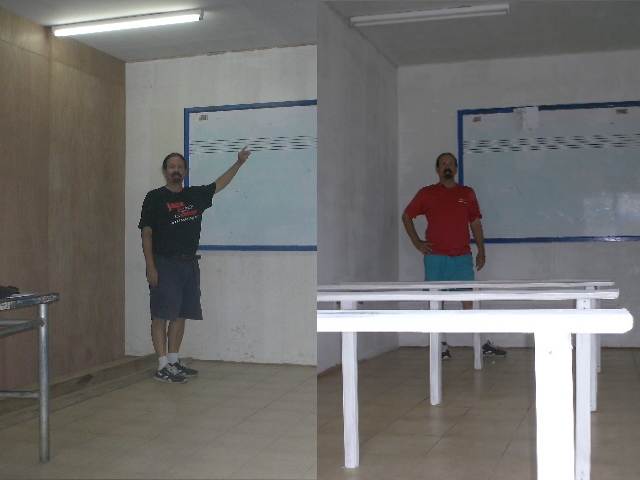
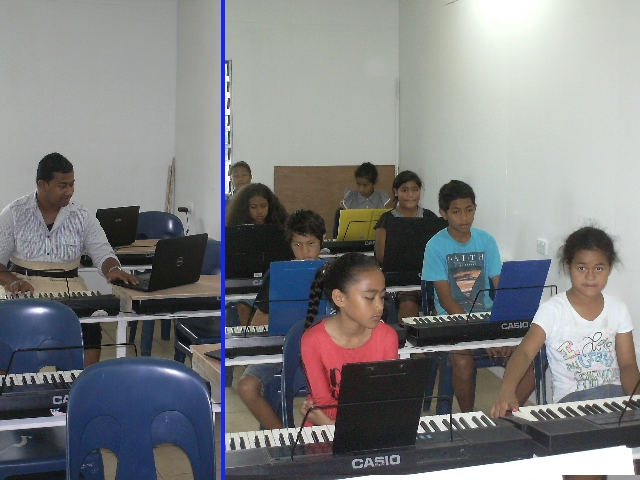 Here at the left are two photos of the piano classroom showing the new
wall construction and the installation of the keyboard tables. These tables
are made to place the keyboards at the precise height for proper hand position
when the students are taking piano classes. A large number of power outlets
were installed for both the 10 keyboards and also for future use of the
classroom in teaching a digilab class with power for laptop computers. The
outlets for the keyboards have a power switch in the front, making it easy
for the piano teacher to switch off all the keyboards when it is time to
provide some lecture instruction. On the right you can see a piano class
underway and also along the left side is another photo of professor Sione
Palavi with the drop-down laptop tables showing digilab capability in use.
Here at the left are two photos of the piano classroom showing the new
wall construction and the installation of the keyboard tables. These tables
are made to place the keyboards at the precise height for proper hand position
when the students are taking piano classes. A large number of power outlets
were installed for both the 10 keyboards and also for future use of the
classroom in teaching a digilab class with power for laptop computers. The
outlets for the keyboards have a power switch in the front, making it easy
for the piano teacher to switch off all the keyboards when it is time to
provide some lecture instruction. On the right you can see a piano class
underway and also along the left side is another photo of professor Sione
Palavi with the drop-down laptop tables showing digilab capability in use.
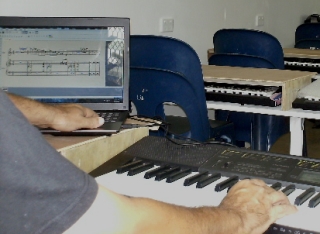 Here is a photo of how one uses the piano keyboard with your right hand
while using the laptop with your left hand when the drop-down tables are
down in digilab position. This covers one of the keyboards and cuts down
the capacity of the classroom but provides an ideal position for when
you are entering music from the keyboard into the music notation software.
Making music on a computer is more efficient that using pencil and paper,
but it is still an arduous task that takes hours of careful work. With this
orientation of the keyboard and laptop it greatly speeds up the work of
note entry. It is fortunate that the price of laptop computers has dropped
to such a low price that many Tongan students now have someone's old laptop.
It is interesting that sometimes this means a laptop where the display
screen is broken, but we provide an extra power point for an external
display that some students carry with their laptop. In order to provide
students with digilab education we use only free software including
Muse Score for music printing, Audacity for audio recording, and MixPad
for DAW (digital audio workstation). These software packages are quite
sufficient for teaching and also for making professional sounding
music productions.
Here is a photo of how one uses the piano keyboard with your right hand
while using the laptop with your left hand when the drop-down tables are
down in digilab position. This covers one of the keyboards and cuts down
the capacity of the classroom but provides an ideal position for when
you are entering music from the keyboard into the music notation software.
Making music on a computer is more efficient that using pencil and paper,
but it is still an arduous task that takes hours of careful work. With this
orientation of the keyboard and laptop it greatly speeds up the work of
note entry. It is fortunate that the price of laptop computers has dropped
to such a low price that many Tongan students now have someone's old laptop.
It is interesting that sometimes this means a laptop where the display
screen is broken, but we provide an extra power point for an external
display that some students carry with their laptop. In order to provide
students with digilab education we use only free software including
Muse Score for music printing, Audacity for audio recording, and MixPad
for DAW (digital audio workstation). These software packages are quite
sufficient for teaching and also for making professional sounding
music productions.
 Here is a photo of the studio during the blessing of the new construction.
The T.H.S. alumni funded the purchase of new equipment for both the hall
and the studio. We were able to get a new dual processor laptop with the
studio quality RME recording interface. To go with that we got Australian
Rode pencil condenser microphones, a couple of EV RE20 mics, and a pair of Audix choral microphones
with very long carbon fiber booms. There was a glitch in bringing these long
booms back from the USA, as FedEx told us there was a Tongan government limit
on shipping items into the country longer than 64". A Tongan family was able to
bring them in through New Zealand as part of their luggage. For teaching the
arts of modern studio recording technique we got an Audient Mico microphone
preamp with fiber optic digital interface and a sE 4400 large diaphragm condenser
vocal microphone with Reflexion filter and pop screen. I think these programs are
really essential for Tongan music education, as the quality of the recording arts
in the Kingdom have not been able to match the interest and enthusiasm for music
within Tongan culture at large. One finds a typical Tongan choral enthusiast to be
involved in singing nearly every day for several hours, especially as any one of the
numerous special performance events approaches. The choral music in favor is largely
well suited to the highly reverberant spaces available like the Tupou High School
Assembly hall and the Centenary church, but the students have a growing interest in
contemporary music practices too. It will be necessary to provide new performance
spaces to meet the needs of future generations of Tongan music students. Failing
this challenge could mean the Tongans traditionally cherished enthusiasm for music
involvement could be lost. This is one reason that a long term plan for Tupou Music
School will have to include a new school campus with better facilities.
Here is a photo of the studio during the blessing of the new construction.
The T.H.S. alumni funded the purchase of new equipment for both the hall
and the studio. We were able to get a new dual processor laptop with the
studio quality RME recording interface. To go with that we got Australian
Rode pencil condenser microphones, a couple of EV RE20 mics, and a pair of Audix choral microphones
with very long carbon fiber booms. There was a glitch in bringing these long
booms back from the USA, as FedEx told us there was a Tongan government limit
on shipping items into the country longer than 64". A Tongan family was able to
bring them in through New Zealand as part of their luggage. For teaching the
arts of modern studio recording technique we got an Audient Mico microphone
preamp with fiber optic digital interface and a sE 4400 large diaphragm condenser
vocal microphone with Reflexion filter and pop screen. I think these programs are
really essential for Tongan music education, as the quality of the recording arts
in the Kingdom have not been able to match the interest and enthusiasm for music
within Tongan culture at large. One finds a typical Tongan choral enthusiast to be
involved in singing nearly every day for several hours, especially as any one of the
numerous special performance events approaches. The choral music in favor is largely
well suited to the highly reverberant spaces available like the Tupou High School
Assembly hall and the Centenary church, but the students have a growing interest in
contemporary music practices too. It will be necessary to provide new performance
spaces to meet the needs of future generations of Tongan music students. Failing
this challenge could mean the Tongans traditionally cherished enthusiasm for music
involvement could be lost. This is one reason that a long term plan for Tupou Music
School will have to include a new school campus with better facilities.
To better understand this current music interest, it is necessary to know a bit about Tongan choral music history. This was the subject of my dissertation, but I won't bore you with a lengthy discussion (you can read it by following the link on the 'about the author' page of this website). Descriptions of Tongan choral music practice from the 17th century reveal the depth of their involvement and the precision of their performance. After the Protestant conversion in the 19th century there were several impediments to continuation of their music traditions, but they did adopt a deep enthusiasm for Western classical sacred music. This enthusiasm still holds a hegemony within the Wesleyan church, which has led in some degree to the growth of pentacostal denominations and their contemporary praise music practice. In the video at the left you can see a student performance group I am involved with. What I have seen in recent years is that student performance groups who are involved in classical sacred music have lost their edge. Now the student and adult performances of traditional Tongan dances are not at all like the precision performances described in the journals of Captain Cook and others. Sadly they most often have degenerated into slapstick comedy characterizations of their ancient traditions. Since when has Tongan tradition become a comedy? I believe that Tongan traditional enthusiasm and involvement in music performance has not been served by the exclusive focus upon brass bands and classical sacred music. You can see a renewed enthusiasm and precision present in this video that is missing in the everyday music and dance performances around the Kingdom now, and so this is the direction we need to take for students here.